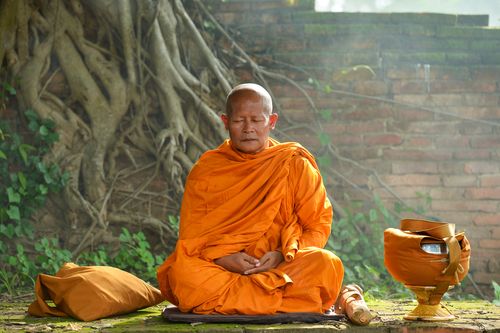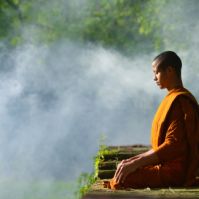 More than 95% of Cambodians are Buddhist, and this large majority is in mourning this month over the loss of the Great Supreme Patriarch Tep Vong. A highly respected religious leader who played a crucial role in reviving Buddhism after the dark period of the 1970s, Tep Vong will live on in memory as people across the country honor his political and spiritual legacy.
More than 95% of Cambodians are Buddhist, and this large majority is in mourning this month over the loss of the Great Supreme Patriarch Tep Vong. A highly respected religious leader who played a crucial role in reviving Buddhism after the dark period of the 1970s, Tep Vong will live on in memory as people across the country honor his political and spiritual legacy.
Who Was Tep Vong?
Tep Vong was a Cambodian monk who survived the Khmer Rouge genocide and eventually reached the rank of Great Supreme Patriarch within the Cambodian sangha, the Buddhist monastic community. Tep Vong was the country's spiritual leader, and he passed away on February 26th, 2024, at the age of 93. Throughout his life, Tep Vong dedicated himself to serving the Buddhist community and guiding its restoration after a period of immense hardship.
Born in 1932 near the famed Angkor temples, Tep Vong first entered the monkhood in 1952. However, he was forced to defrock under the brutal Khmer Rouge regime. This experience undoubtedly shaped his resolve and determination to rebuild the faith he held so dear. Following the fall of the Khmer Rouge, he became a key figure in re-establishing the sangha. He also had a close relationship with Cambodia's long-ruling prime minister, Hun Sen.
What Was the Khmer Rouge Genocide?
To understand Tep Vong's significance, it's important to understand what Cambodia and its people went through under the Khmer Rouge regime, which ruled the country from 1975 to 1979. Despite being in power for only four years, the Khmer Rouge, led by Pol Pot, rained terror down on the people of Cambodia, resulting in the deaths of between 1.5 and 3 million people, roughly one-third of the population at the time.
The Khmer Rouge came to power intending to dismantle Cambodian society to start over again from what the leaders of the regime referred to as "Year Zero," an imagined time when Cambodia was an agrarian society with no class system. The regime's soldiers emptied every major town, driving people from urban areas into the countryside.
Life was anything but idyllic under the Khmer Rouge. The regime perpetrated mass killings, separated families, forced people to work with little food, and withheld basic, life-saving medicine. They also targeted religious life, destroying temples, banning religious practices, and persecuting monks. After four years, very few Buddhist monks and nuns had survived, which is why Tep Vong mattered so much to the people of Cambodia.
What Are Common Funeral Practices in Cambodia?
Tep Vong's funeral will likely be attended by thousands of people, and even more will honor him in their homes and at their local pagodas. In Theravada Buddhist tradition, people mourn over the body of the deceased for three to seven days while monks chant prayers. After that, the body is cremated on a funeral pyre. At the one-hundred-day mark, another ceremony takes place to help the deceased accept the Buddhist cycle of rebirth.
How Will Cambodians Commemorate Tep Vong?
People will remember Tep Vong for his dedication to his faith, his resilience in the face of adversity, and his pivotal role in reviving Buddhism. His fellow monks will watch over his body at Wat Ounalom, a significant temple in the capital city, Phnom Penh, and oversee public viewings before his funeral.
Tep Vong's life and work serve as a powerful reminder of the human spirit's ability to overcome adversity. He leaves behind a legacy of dedication and service that will continue to inspire Cambodians for generations to come. As the nation mourns his loss, his spirit lives on in the hearts of those who cherish his contributions to their faith and their country.



